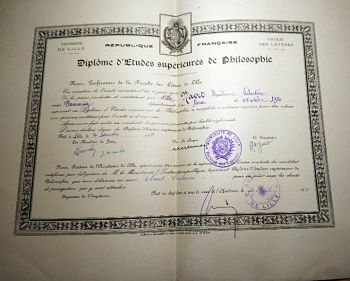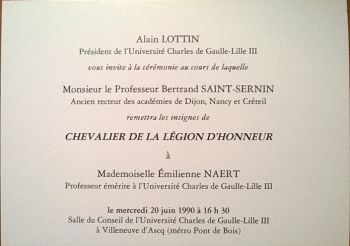
Émilienne Valentine Naert was born in Tourcoing on 25 October 1920. She was the daughter of shopkeeper Émile Naert and Valentine Croquette. She passed her brevet supérieur in 1939 and her baccalauréat in philosophy in 1941. She lived in Armentières for part of the way, probably with her mother’s family, where she is said to have taken part in resistance activities, helping British parachutists. But Émilienne Naert remained very discreet about this part of her life. However, one anecdote has survived that reveals her composure: during interrogation by the Germans, she pretended to be simple-minded, like her sister, which led to her release.Harbouring, supporting and failing to report Allied servicemen were acts punishable by death. Her harrowing experience of war undoubtedly nourished her thoughts and work in the years that followed:
While she found in Leibniz a way of rationally conceiving the world as God’s creation, of contemplating the existence of evil and determining man’s role and responsibility as part of creation, being a quietly avowed Christian steered her more towards Pascal and Kierkegaard. 1
Higher education and early career
She continued her studies at the Independent Faculty of Lille until the end of the war, obtaining her certificate in higher education before joining the Lille Faculty of Arts. After obtaining a Certificate of Advanced Studies in the History of Philosophy (1945), a Bachelor of Arts in Teaching (1949) and a post-graduate degree (DES) in Philosophy in 1950 on ‘Leibniz: Faith and Reason’, Émilienne Naert obtained her doctorate from the Lille Faculty of Arts under the supervision of Éric Weil, graduating with first-class honours in 1959. The subject of her doctoral thesis was ‘Leibniz and the Quarrel of Pure Love. Memory and self-awareness according to Leibniz’. Starting from when she was working towards her doctorate, she maintained a friendly relationship with Éric Weil that was to mark her academic future.
She began her teaching career as a philosophy teacher at the Loos Diocesan Teacher Training College until 1959, before becoming a lecturer at the Catholic Faculty of Lille (1959-1965). She spent a short period in Paris at the Sorbonne as a ‘maître-assistant’ (1965-1966). Much later, she would recount her introductory lecture debuts with these words:
I don’t know whose brilliant idea it was to include a musical entrance to these classes. So every Thursday morning at 10:45, I went to a small workshop to choose the piece of music that would accompany my descent into hell. Then, preceded by an usher, with a well-fitting lapel microphone, I made my way down the amphitheatre’s endless series of steps. I only had one fear: that of missing a step, but this fear produced a beneficial effect: it dissipated the anxiety of having to speak in front of too large an audience.’
After that, she held a position at the Amiens University Literary College as a ‘maître de conférences’ (senior lecturer) and then professor. The opportunity arose to return to Lille, where a teaching post at the Faculty of Arts became available in 1968. The Chair of Philosophy was created for her in 1969. This chair allows her to get settled.. The events of 1968 turned the academic world upside down.
A commitment to the University of Lille
Émilienne Naert played an active role in the creation of the new Lille 3 university, taking part in the founding assembly and in particular in the creation of the Philosophy Academic Unit (Unité d’Enseignement et de Recherche; U.E.R), which she was elected to head by her colleagues from the very start of the university (1970-1977), becoming the first woman at Lille 3 to head a U.E.R. She took over the management of the U.E.R in 1985 until her retirement in 1989. Her colleagues praised her ‘availability and kindness to students, teachers and administrative staff’.
According to her colleague Claude Roubinet: ‘[The students] recognised the attention she was able to give them in a way that was both attentive and effective. Director of the U.E.R., she was an instrument of peace, resolving potential conflicts (timetables, course assignments) with firmness and kindness. I recall with emotion her availability to take on others’ concerns, her friendly presence... and also how she always looked so elegant and well put together, lighting up our corridors...’
Her commitment extended beyond her own academic unit, as she was elected member of the University Council, the university’s Vice-President of the Studies and University Life Committee from 1987 to 1990, and to the Board of Directors when chaired by Jean Celeyrette and then Alain Lottin. She was a member of various university committees, the University Advisory Committee, the National Committee of the CNRS (45th section) and the jury for the agrégation competitive teaching exam in 1970 and 1980, and again in 1983-1986.
Her colleague Claude Roubinet had the following to say about her: ‘It seems to me that she was the first woman in our university to combine her many responsibilities, hitherto reserved for male colleagues: university council, advisory committee, agrégation jury... bringing an air of both authority and benevolence wherever she went. I’m happy to think that the journey of this friend to both my husband and myself illustrates the importance of women in teaching, research and university management.’
Émilienne Naert took over the management of the IPES (Institut de préparation aux enseignements du second degré) on 23 November 1970.
Recognition for an exemplary career
A student of Éric Weil, she co-founded and directed the centre dedicated to him from 1981 to 1989, having also been appointed executor by Anne Weil and Catherine Mendelsohn. This centre has helped to ensure a strong and lasting interest in research on Éric Weil in France. Today, the Éric Weil Institute remains his most visible legacy within the University of Lille.
Émilienne Naert specialised in Leibniz, but was also interested in classical English philosophy. She wrote several books, including ‘Mémoire et conscience de soi selon Leibniz’ (Memory and Self-Awareness According to Leibniz) in 1961, ‘La pensée politique de Leibniz en 1984’ (Leibniz’s Political Thinking in 1984) and ‘Locke ou la raisonnabilité’ (Locke or Reasonableness) in 1973, as well as numerous articles.
She was named ‘Commandeur des Palmes académiques’ in 1985 and ‘Chevalier de la Légion d’honneur’ on 20 June 1990. On this occasion, Bertrand Saint-Sernin, former professor at Lille 3 and former rector of the Dijon and Nancy-Metz education authorities, delivered his eulogy. The Légion d’honneur awarded to her was that of Éric Weil, in accordance with the wishes of the deceased’s family. In her thank you speech, Émilienne Naert stressed what the award of this decoration meant to her as a woman:
‘Finally, it’s a woman in the spotlight.It’s not often that women are admitted to the order created by Bonaparte on the 29th of Floréal, Year X. They rarely have the stature and build of a legionnaire. Admittedly, they rarely have the stature and build of a legionnaire. I’m delighted that I’m being honoured for all the women who perform various roles at the university. They know just as well, and sometimes perhaps better than men, that to accomplish one’s task well is, as Péguy said of his mother, the humble upholsterer: a profession, an honour, the very principle of cathedrals.’
Émilienne Naert retired in 1989 and was appointed Professor Emeritus of the university. She died in Lille on 28 February 2001. Her former colleague and friend Gilbert Kirscher said of her in his eulogy:
She was attentive to others, to their worries, to their joys and sorrows, discreetly, without being ostentatious. She was fundamentally benevolent. She was selfless and modest, with a smiling, mischievous modesty. She was cheerful, perhaps because she knew very well the difference between what matters and what doesn’t matter. She had a sense of the beauty of nature and the value of works of art. She was particularly fond of painting. She gave the impression of being serene, of having achieved that lucid and generous contentment we call wisdom.’
Notes written by Sarah Lagache.
[1] ‘In memoriam Émilienne Naert’ by G. Kirscher and J. Quillien, Bulletin de la Société française de Philosophie, no. 1, 96th year, January-March 2002, pages 39-40.
Sources
Nord Department Archives
Faculty of Arts Student file - 2640W560
University of Lille Archives
Teacher’s file
Lille 3 Governing Council minutes
Institut Éric Weil Archives
Quillien (J.), notes on ‘Naert, Émilienne’, Le dictionnaire des philosophes, Paris, PUF, 1993, p. 2085.
Bertrand Saint-Sernin’s eulogy at the Légion d’Honneur ceremony
Émilienne Naert’s speech of thanks for the Légion d’Honneur
Nord éclair and Voix du nord press kit, 1990
Death announcement
Eulogy for Émilienne Naert by G. Kirscher
The author would like to thank the following people for their testimonials and kind help:
Bertrand Saint-Sernin, Gilbert Kirscher, Jean Quillien, Patrice Canivez and Claude Roubinet.




